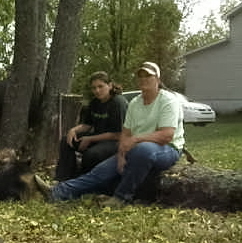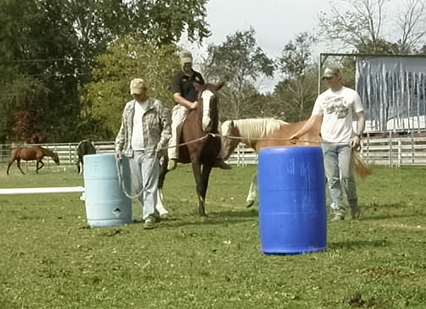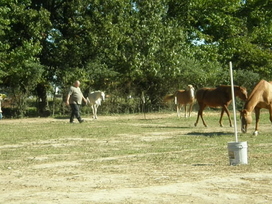Equine Therapy and Life Skills...

Equine therapy can be particularly effective for a variety of reasons, including the fact that horses do not suffer from the human fallibilities that all two-legged therapists do.
Because of the many unique and effective aspects of a quality equine therapy program, working with horses under the supervision of qualified equine therapy professionals can lead to the development of a wide range of skills in all individuals.
Encouraging Honesty
Horses are always honest – the example that this honesty sets goes a long way in the effort to help individuals become more honest towards themselves and want to take greater accountability for their actions.
Because of the many unique and effective aspects of a quality equine therapy program, working with horses under the supervision of qualified equine therapy professionals can lead to the development of a wide range of skills in all individuals.
Encouraging Honesty
Horses are always honest – the example that this honesty sets goes a long way in the effort to help individuals become more honest towards themselves and want to take greater accountability for their actions.
|
1. Individuals who refuse to admit responsibility for their actions and behaviors will encounter many difficulties when working with horses.
2. Because horses are not manipulative and do not establish artificial rules, the consequences the individuals experience when participating in equine therapy occur naturally, not artificially. 3. On the other hand, once individuals begin to admit their mistakes and search for ways to fix them, they are naturally rewarded by their equine partner. 4. By working with horses, individuals learn to be accountable for their actions and feelings, and gain greater insights into the way these actions and feelings affect others. Improving Relationships Horses can also help individuals build important relationship skills. For most individuals, riding a horse is a huge issue of trust – they must be willing to trust the horse before they can be successful. |
Building relationships
This experience during an equine therapy session can bring up issues of trust that individuals are facing in their relationships with their friends and family members.
1. Individuals who have been unwilling or unable to form positive, healthy relationships in their lives sometimes find their equine partner to be the first successful relationship they have ever had.
2. This relationship can form a model for other relationships, teaching the individuals skills such as empathy and patience
This experience during an equine therapy session can bring up issues of trust that individuals are facing in their relationships with their friends and family members.
1. Individuals who have been unwilling or unable to form positive, healthy relationships in their lives sometimes find their equine partner to be the first successful relationship they have ever had.
2. This relationship can form a model for other relationships, teaching the individuals skills such as empathy and patience

Developing Communication Skills
As in a human relationship, the relationship that develops while working with a horse in an equine therapy program – for example, successfully riding and training the horse -- requires positive, healthy communication.
1. Horses respond best to assertive body language and decisive cues, not the mixed signals that individuals often give.
2. Eventually individuals learn that communication with the horse is two-sided, just as with people.
3. This requires individuals in the equine program to pay attention to what their equine partner is saying.
4. Horse’s encourage and mirror non-verbal communications making them an invaluable teacher of patience and non-verbal communication skills.
Managing Anger Horses are great teachers of anger management and patience. Working with a creature who does not speak a verbal language can be a very frustrating task.
When working with horses in an equine therapy program, individuals are naturally rewarded when they are patient, and quickly find themselves becoming unsuccessful when getting frustrated or angry.
Building Confidence
Finally, working around horses in a program such as the Calico Junction New Beginnings Ranch equine therapy program helps individuals build a great amount of confidence in themselves.
1. Individuals experience dramatic positive changes as they learn how to work through fear, work towards goals, and strive for success.
2. Learning how to be successful with horses gives individuals the confidence and skills they need to work towards goals in other areas of their lives.
3. We have had a number of individuals whose school career was jump-started by their enthusiasm for horses.
Many of our individuals have also told us that riding horses is the best high they experienced without using alcohol, drugs or other illicit substances. Finding ways for individuals to spend their time in productive and healthy manners is an important part of any teen recovery program – and having these types of “natural highs” in productive endeavors is a great boost to individuals self confidence.
Ultimate Goal
Our ultimate goal with all individuals is to teach them to do the right thing because they believe it is the right thing to do. Equine therapy is based on simple, easily understood principles that aid in developing relationships based on trust, respect, understanding and love. Through this knowledge they will gain a clear understanding of the difference between passive, aggressive, and assertive behavior and the effects of each. This teaches the individual and the horse the right thing to do. Not because they are afraid or out of fear, intimidation or appeasement but because it is the right thing to do. This is the point where ‘horse whispering” transitions to “life whispering with horses”.
As in a human relationship, the relationship that develops while working with a horse in an equine therapy program – for example, successfully riding and training the horse -- requires positive, healthy communication.
1. Horses respond best to assertive body language and decisive cues, not the mixed signals that individuals often give.
2. Eventually individuals learn that communication with the horse is two-sided, just as with people.
3. This requires individuals in the equine program to pay attention to what their equine partner is saying.
4. Horse’s encourage and mirror non-verbal communications making them an invaluable teacher of patience and non-verbal communication skills.
Managing Anger Horses are great teachers of anger management and patience. Working with a creature who does not speak a verbal language can be a very frustrating task.
When working with horses in an equine therapy program, individuals are naturally rewarded when they are patient, and quickly find themselves becoming unsuccessful when getting frustrated or angry.
Building Confidence
Finally, working around horses in a program such as the Calico Junction New Beginnings Ranch equine therapy program helps individuals build a great amount of confidence in themselves.
1. Individuals experience dramatic positive changes as they learn how to work through fear, work towards goals, and strive for success.
2. Learning how to be successful with horses gives individuals the confidence and skills they need to work towards goals in other areas of their lives.
3. We have had a number of individuals whose school career was jump-started by their enthusiasm for horses.
Many of our individuals have also told us that riding horses is the best high they experienced without using alcohol, drugs or other illicit substances. Finding ways for individuals to spend their time in productive and healthy manners is an important part of any teen recovery program – and having these types of “natural highs” in productive endeavors is a great boost to individuals self confidence.
Ultimate Goal
Our ultimate goal with all individuals is to teach them to do the right thing because they believe it is the right thing to do. Equine therapy is based on simple, easily understood principles that aid in developing relationships based on trust, respect, understanding and love. Through this knowledge they will gain a clear understanding of the difference between passive, aggressive, and assertive behavior and the effects of each. This teaches the individual and the horse the right thing to do. Not because they are afraid or out of fear, intimidation or appeasement but because it is the right thing to do. This is the point where ‘horse whispering” transitions to “life whispering with horses”.

